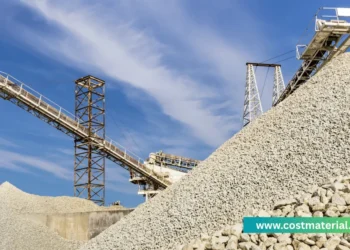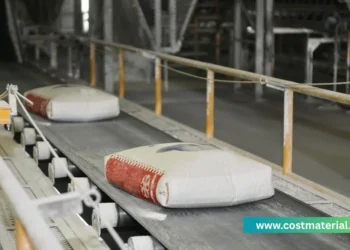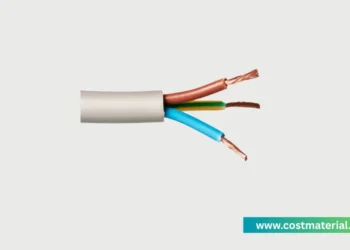Table of Contents
In this blog post, you will learn about the average reinforced concrete pipe or RCP price list 2025 in the Philippines. It also includes the inclusion and exclusion of the unit price, factor affecting the unit price and consideration when buying a reinforced concrete pipe (RCP).
1 Average RCP Price List 2025 in the Philippines
(Prices may vary depending on supplier, location, and project specifications.)
| Diameter (mm) | Class/Strength | Price per Linear Meter (PHP) | Common Applications |
|---|---|---|---|
| 300 mm | Class II | ₱1,500 – ₱2,200 | Drainage, small culverts |
| 450 mm | Class II | ₱2,800 – ₱3,500 | Roadside drainage |
| 600 mm | Class III | ₱4,000 – ₱5,500 | Stormwater systems |
| 900 mm | Class III | ₱7,000 – ₱9,000 | Major drainage projects |
| 1200 mm | Class IV | ₱12,000 – ₱15,000 | Flood control, highways |
| 1500 mm | Class IV | ₱18,000 – ₱22,000 | Large-scale infra |
2 Inclusions in the unit Price
Typically, the unit price of a Reinforced Concrete Pipe includes the following:
Manufacturing Cost: This covers the raw materials (cement, aggregates, steel reinforcement) and the labor involved in producing the pipe.
Standard Curing and Quality Control: This includes testing to ensure the pipe meets the required strength and durability standards.
Basic Transportation (Varies per supplier).
- VAT (12%) in most cases.
3 Exclusions in the Unit Price
The following are generally not included in the standard unit price and will incur additional charges:
✖ Delivery Fees and Transportation: The cost of transporting the pipes from the supplier’s location to the project site is typically shouldered by the buyer and some remote locations may incur charges.
✖ Unloading at the Project Site: Any equipment or labor required to unload the pipes at the destination is usually not included.
✖ Installation: The price is for the supply of the pipe only. Installation costs, including labor, equipment, and any necessary earthworks (excavation, backfilling), are separate.
✖ Jointing Materials: Sealants or gaskets for pipe joints may be sold separately.
4 Factors Affecting Unit Price
Material Costs – Fluctuations in cement, steel, and aggregate prices.
Pipe Class and Strength – Higher strength (Class III/IV) costs more than Class II.
Diameter & Thickness – Larger/wider pipes require more materials.
Supplier/Markup – Prices vary between local manufacturers and dealers.
Location – Transport costs affect pricing (e.g., Mindanao vs. Luzon).
Project Volume – Bulk orders may get discounts.
- Length of Pipe – While the standard length is one meter, some suppliers may offer longer pipes, which could affect the per-meter cost.
5 Considerations When Buying RCP
✅ Quality Standards – Ensure compliance with DPWH or ASTM C76 standards. Ensure that the pipes you are buying meet the engineering design and specifications of your project, including the required diameter and strength class.
✅ Soil & Load Conditions – Choose the right class (e.g., Class IV for heavy traffic areas).
✅ Supplier Reputation – Choose a reputable supplier known for quality products that meet national standards (e.g., Philippine National Standards). Opt for accredited manufacturers (e.g., CEMEX, Holcim PH).
✅ Logistics and Site Access – Consider the transportation of these heavy and bulky items to your project site. Ensure that the delivery trucks can access the area and that you have the necessary equipment for unloading.
✅ Delivery Lead Time – Confirm stock availability for urgent projects. For large orders or non-standard sizes, there may be a manufacturing lead time. Plan your procurement schedule accordingly.
✅ After-Sales Support – Check warranty and technical assistance.
✅ Request for Quotations – Obtain detailed quotations from at least three different suppliers. Ensure the quotes specify what is included and excluded.
6 References for Price Data
Department of Public Works and Highways (DPWH) – Standard price benchmarks for infrastructure projects.
Local Suppliers – Quotes from Philippine RCP manufacturers (e.g., Bacnotan Concrete Pipes, RCP Construction Products).
Construction Material Price Trends (2025) – Industry reports from PhilConstruct Exhibitions.
Online Marketplaces – Platforms like iPrice PH or Hardware stores (e.g., CitiHardware).
(Note: Prices are estimates; actual quotes depend on negotiations and market conditions.)
Did you find this blog post helpful? Share it to others! For more construction material price lists, check our other blog post.





